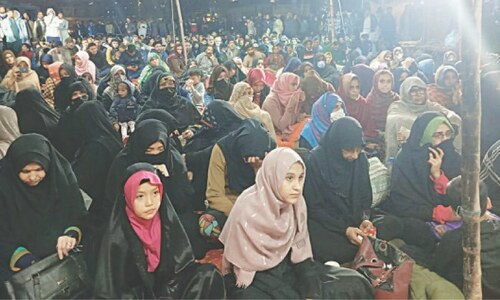KARACHI: While presenting Sindh’s education budget for the fiscal year 2019-20 on Friday, Sindh Chief Minister Syed Murad Ali Shah said that education was the most important criteria for individual as well as collective development of a society and a state and it was the basic bedrock upon which the whole building of prosperity and human development stands.
He announced an increase of allocation for school education in non-development budget from Rs170.832 billion in year 2018-19 to Rs178.618bn in next financial year 2019-20.
On the development side, Rs15.15bn has been allocated in the annual development plan (ADP) 2019-20.
CM says Sindh has taken the lead over other provinces in early childhood care and education policy
“Education enlightens the masses and inculcates values of tolerance, social justice and democracy. This is why when it comes to allocation of resources, education takes preference over all other sectors,” he added.
“We have developed Sindh Education Sector Plan and Roadmap (2019-23) through a consultative process. Civil society, intelligentsia and academia were taken on board considering them equal stakeholders in the development of society,” he said.
“The new sector plan focuses on providing additional classrooms to accommodate fresh entrants to schools and ensuring conducive environment in terms of provision of clean drinking water and toilet facilities and compound walls to ensure retention of students especially girl students.
“Girls’ education has been given a significant preference and sufficient funds have been proposed for girls’ transportation in the rural areas in order to address the issue of low female participation in schools,” he said.
He also said that the government has taken steps to bring out-of-school children into the educational system. “In this connection, the directorate of literacy and non-formal education has been given significant allocation to partner with community-based organisations [CBOs] who would arrange for tutors, while the government would provide school building in evening hours,” he said, while adding that the CBOs will be given management cost on per-child basis.
Another area in focus will be the public-private partnership mode of school education and literacy department, which has been strengthened to work in collaboration with Education Management Organisations (EMOs) to impart quality education to students along with early childhood education (ECE).
The chief minister said that Sindh had taken the lead over other provinces here and had approved an early childhood care and education policy. “We have already established 1,500 ECE classes in our government schools, while we plan to establish another 1,500 ECE classes in the coming financial year 2019-20,” he said.
It was explained that for the purpose of efficient management and evidence-based planning, the school education and literacy department has conducted census of all government schools during January and February 2019 through the use of technology thanks to which they have real-time accurate data available which will not only help improve decision-making, but also enable the utilising of their optimal resources.
The major emphasis under school education during the year 2018-19 remained on the rehabilitation and expansion of 4,560 high priority schools. These schools had high enrolment, but required adequate facilities in classrooms, washrooms, water, electricity and adequate teaching faculty to encourage better learning environment and create space for additional enrolment.
It was said that the school education department would complete 1,437 units by the end of June 2019. A further 1,973 government schools have been provided with clean and safe drinking water facilities and another 367 schools will be provided with it through a new development scheme.
The school education portfolio has been allocated Rs15.15bn for 279 schemes (188 ongoing and 91 new schemes).
Further the major initiatives incorporated for next year are construction of six-room buildings for 20 shelterless primary schools, rehabilitation of 113 primary schools in dangerous buildings, but with high enrolment with additional classrooms and provision of missing facilities and establishment of 35 model school complexes by converting existing high schools along with their feeder primary schools into better learning centres.
The government expects the completion of 1,772 schools from the high priority 4,560 schools in 2019-20 through 42 schemes at the primary and secondary level.
Rs9.597bn for Sindh Education Foundation
About the Sindh Education Foundation (SEF), the CM said that earlier it was able to make a major breakthrough when it managed to increase the enrolment from 256,000 to 550,000 (100 per cent) in a record period of three years. He said that for the coming year the government was proposing an allocation of Rs9.597bn in the SEF budget.
College education
The allocation for college education is increased in non-development budget from Rs15.777bn in the year 2018-19 to Rs18.094bn in next financial year 2019-20.
On the development side Rs4bn is allocated in ADP 2019-20.
The major development initiatives in college education department for ADP 2019-20 are plans for 17 new degree colleges to be established in districts of Karachi (Korangi, Malir, West), Hyderabad, Umerkot, Sukkur, Jamshoro, Shikarpur, Jacobabad and Sanghar.
The construction/rehabilitation and provision of furniture for existing colleges in different districts is also planned through different schemes. Provision of missing facilities for cadet colleges in Gadap and Pano Akil Cadet Colleges has been proposed in 2019-20.
Universities and boards
The allocation for the universities and boards department has been increased in non-development budget from Rs9.529bn in the year 2018-19 to Rs10.585bn in 2019-20.
The government has earmarked Rs3bn for 2019-20 through which various initiatives relating to higher education such as establishment of a centre of robotics, artificial intelligence and blockchain at Sukkur IBA University, establishment of Thar Institute of Technology on the NED Campus of Tharparkar and the establishment of Sindh University campus at Badin and Mirpurkhas will be financed.
Published in Dawn, June 15th, 2019













































